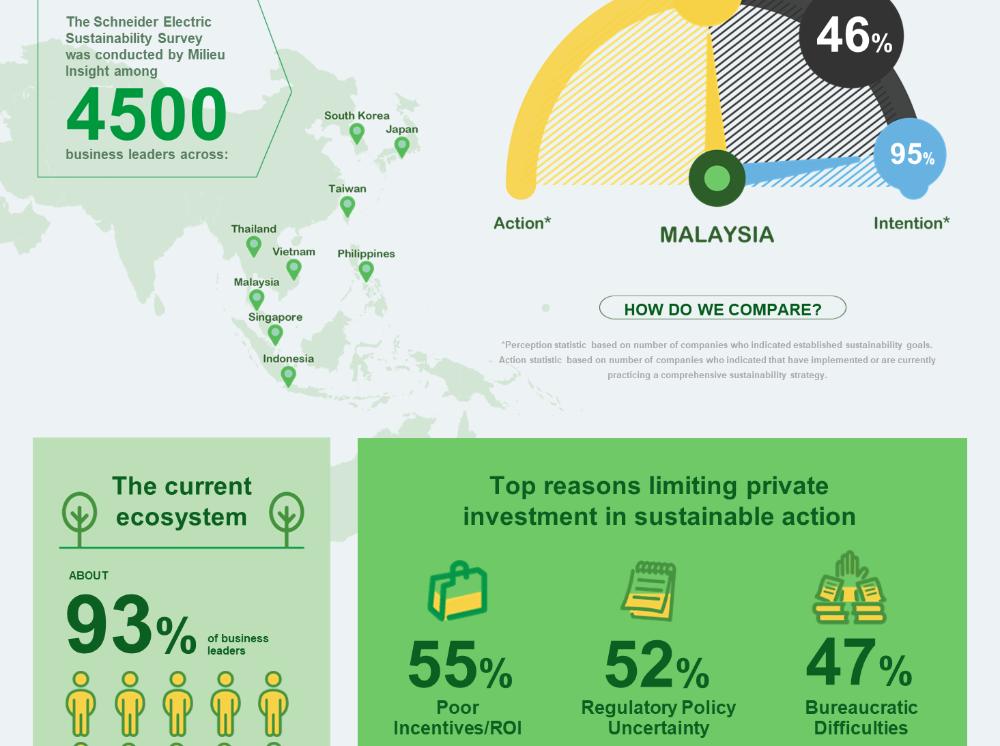KUALA LUMPUR, November 28, 2023 – Although 95% of companies in Malaysia have established sustainability goals or targets, only half (49%) have implemented or are currently practising a comprehensive sustainability strategy, according to the Schneider Electric Sustainability Survey 2023.
Schneider Electric, the leader in the digital transformation of energy management and automation, conducted the survey in partnership with Milieu Insight with the aim to identify the intention-action gap amongst companies in Asia. The survey also examined the perceived importance of sustainable business practices and the investment or tangible commitment towards achieving them.
About 4,500 business leaders from nine East Asia countries, including 500 respondents from Malaysia, were surveyed on their perspectives around sustainability and the environment. The survey primarily targeted middle to senior-level executives within the private sector, representing companies with employee counts ranging from over 1,000 to below 50. The surveyed companies span across industries, including Real Estate, Transport and Infrastructure, Data Centres, Cloud and Service Providers, Financial and Professional Services, among others. The other East Asia countries surveyed include Indonesia, Japan, South Korea, Philippines, Singapore, Taiwan, Thailand and Vietnam.
Intention vs Action: The Green Action Gap
The survey examines each country’s “Green Action Gap”: a Schneider Electric-identified metric used to estimate the rift between the perceived importance of sustainable goals and the tangible actions to implement sustainable development by companies.
In Malaysia, the Green Action Gap lies at 46% - highlighting the difference between companies who have established sustainability goals (95%) and those who have implemented or are currently practising a comprehensive sustainability strategy (49%).
The survey found that 93% of the respondents consider sustainability to be a high priority for their company, while 92% believe that the country has the same view. Around 57% of respondents also said their companies have dedicated departments or teams responsible for driving sustainability goals and strategies.
A resounding 95% of business leaders acknowledge the pivotal role of digitalisation in their corporate sustainability strategy. Simultaneously, an equally high percentage, 95%, recognises the significance of integrating energy efficiency into their overall corporate sustainability approach. This underscores a need to bridge the gap between intention and action, emphasising the important role of technology and energy efficiency in shaping the corporate sustainability landscape.
Motivations and Pain Points
In Malaysia, the top reasons reported for pursuing corporate sustainability were increasing business opportunities (44%) as well as innovation and competitiveness (41%). Risk management, reputation and opportunity for cost-saving were also among the top five motivations for companies.
Unsurprisingly, most business leaders in Malaysia (85%) believe that providing more incentives is more effective than enforcing penalties to encourage private sector compliance with government sustainability goals.
Looming Deadlines A Push Factor
The survey also revealed that despite the vast majority of companies having sustainable goals in place, 74% of these goals are short-term, spanning the next four years or less.
The findings suggest that companies may be more confident in setting detailed targets for the near future but struggle to turn broad sustainability plans into concrete actions until they approach the "deadline" for achieving these goals.
Eugene Quah, Country President for Malaysia of Schneider Electric said, "We are encouraged by the growing awareness and commitment among Malaysia’s companies to establish sustainability goals. However, the survey's findings on the intention-action gap reveal that there is still work to be done, and this gap stands at approximately 46%. It is crucial for companies in Malaysia to translate their sustainability aspirations into tangible actions, addressing implementation challenges and embracing long-term strategies.”
“As we navigate the urgent need for sustainability, it is imperative for businesses to take a leadership role in driving change, collaborating with governments, and leveraging innovative solutions to create a more sustainable future for our country and the planet,” he added.
Key Survey Highlights
What does the current ecosystem look like?
- 95% indicated that their company has established sustainability goals or targets.
- Less than half (49%) have implemented or are currently practising a comprehensive sustainability strategy.
- 74% of these goals are short-term, spanning the next four years or less.
- 93% of business leaders feel that their company views sustainability as a ‘high priority’.
- 57% have a dedicated sustainability department in their organisation.
Why are Malaysian companies investing in sustainability?
- 44% of them are driven by an increase in business opportunities.
- 41% are motivated by the potential for innovation and increased competitiveness.
- 34% are focused on enhancing brand perception and reputation.
- 33% are considering sustainability for both risk management and opportunities for financial benefits or savings.
How can companies overcome barriers to change?
- Top barriers to corporate investment in sustainability: Poor incentives/ low return on investment (55%), regulatory/policy uncertainty (52%), lack of priority and bureaucratic difficulties (47%) and lack of market data to support (43%).
- 85% of the respondents prefer incentivisation to encourage compliance for private companies to comply with government sustainability regulations.
- Opportunity:
- 96% agree that having a sustainability strategy helps attract and retain talent.
- 96% of respondents believe that pivoting towards sustainability will help gain more business opportunities.
Who should bear responsibility?
- More than half (57%) of business leaders believe that private sector companies should take the lead in sustainability efforts, followed closely by the national government at 52%.
###





